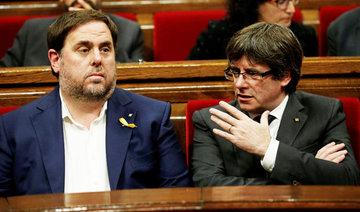BARCELONA: With their leaders in exile or jail, Catalan separatists scrambled Friday to reap the benefits of defeating Spain’s central government in a divisive regional election.
Madrid had called Thursday’s poll after secessionists declared independence on Oct. 27, in Spain’s worst political crisis since democracy was reinstated following dictator Francisco Franco’s death in 1975.
The vote was widely seen as a moment of truth on Catalonia’s independence question, a hugely divisive issue for the wealthy northeast region, that has rattled a Europe already shaken by Brexit.
But with the secessionists maintaining a majority in the Catalan Parliament, the move to call snap polls appeared to backfire against Spain’s Prime Minister Mariano Rajoy, who had sacked the regional government and dissolved its Parliament.
Rajoy on Friday rejected a call by ousted Catalan leader Carles Puigdemont to meet.
“The person I should be meeting with is with the one who won the elections, and that is Mrs. Arrimadas,” Rajoy said.
Rajoy was referring to centrist, anti-independence candidate Ines Arrimadas, whose Ciudadanos party won the best individual result in Thursday’s poll — even as the bloc of separatist parties maintained its absolute majority.
The prime minister meanwhile warned that the new Catalan government should fully respect the law. He also said that he was ready for “open, constructive and realistic dialogue” — but “always within the limits of legality.”
Emboldened by his side’s win, Puigdemont called on Rajoy to hold talks in Brussels, where he has sought self-imposed exile, or anywhere else in Europe — barring Spain, where he faces arrest.
He also called on the EU, which has so far sided with Rajoy in the crisis, to hear out the independence camp.
“I only demand to the European Commission or other European institutions, to listen, to listen to the Catalan people, not only the Spanish state,” he told reporters in Brussels.
In making this appeal, he was pursuing a strategy he has followed throughout the crisis, by positioning himself as an equal to the Spanish prime minister, and seeking recognition from the international community.
Puigdemont’s Together for Catalonia list secured the best result of the three separatist groupings.
“The biggest loser of election night was the People’s Party (PP) of Prime Minister Mariano Rajoy, which obtained only three seats,” said Antonio Barroso, a political risk analyst at Teneo Intelligence in London.
How the independence camp intends to rule remains a mystery, however — and should its leaders fail to put their house in order, Catalans may even have to return to the polls.
“It is unclear whether Puigdemont will be able to be re-appointed... as he will be arrested if he comes back to Spain,” Barroso said.
“As a result, the investiture process will be far from straightforward, and the risk of new elections in 2018 remains high,” he added.
“The investiture of a new first minister is likely to be a protracted and noisy process,” he said.
Puigdemont faces charges of rebellion, sedition and misuse of funds in Spain.
Other independence leaders, including Puigdemont’s former deputy Oriol Junqueras, are behind bars pending trial.
And a Spanish judge on Friday expanded a probe into the secessionist bid to include another six independence leaders, including former regional President Artur Mas, according to a court decision seen by AFP.
Meanwhile, in a clear indicator of the gulf over independence afflicting Catalan society, anti-secessionist centrist party Ciudadanos won the biggest individual result with 37 of the 135 seats in the regional Parliament.
Unless the three pro-independence lists fail to clinch a deal to work together in the coming months, however, they will govern Catalonia with 70 seats — two less than their previous tally.
Ciudadanos’s candidate Ines Arrimadas saw the glass half-full for the anti-independence side.
The fragmented vote result shows Spain and the world “that here in Catalonia there has never been a secessionist majority,” she told reporters.
Rajoy has repeatedly said there can be no talks unless separatists abandon their independence drive.
Pablo Casado of Rajoy’s PP party warned the separatists that “whatever new government rules the region, (the separatists) know the consequences for breaking the law.”
Crucially, for all the talk that the separatist cause had been legitimized, analysts predict a softening around the edges of the independence bid.
The Catalan business elite, some of whose members have close links with Puigdemont’s party, “know that they have to give a fresh boost to tourism and the economy,” sociologist Narciso Michavila told AFP.
At stake in the crisis is the economy of a region that has seen its tourism sector suffer and more than 3,100 companies — including the largest banks, utilities and insurers — move their legal headquarters out of Catalonia.



























